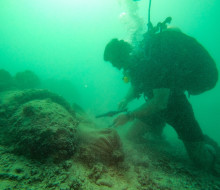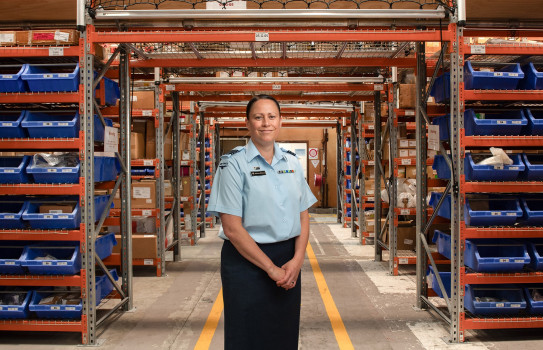
Second World War-era bombs in Vanuatu made safe by Navy divers
26 June 2024
Unfortunately you are viewing this website on an outdated browser which does not support the necessary features for us to provide an adequate experience. Please switch to a modern browser such as latest version of Google Chrome, Mozilla Firefox, Apple Safari or Microsoft Edge.
Ngā mihi nui
Squadron Leader Melissa ‘Mel’ Mikaere says allowing women to prioritise their family while still maintaining their careers in the New Zealand Defence Force (NZDF) achieves positive outcomes for everyone.
Originally from Flaxmere, Hawke’s Bay, Squadron Leader Mikaere currently juggles life as a mum with her responsibilities as a Logistics Officer with the Royal New Zealand Air Force (RNZAF), in Auckland.
She grew up loving sports and new adventures, which led her to consider a career with the NZDF.
“I didn’t want to get a student loan to go to university when I didn’t really know what I wanted to do there. I’d heard that in the Defence Force you got paid to play sport!”
Military service runs in the family; her father was in the NZ Army and her husband also serves in the Air Force.
Today she’s in charge of the logistics squadron that provides support primarily to Auckland- and Woodbourne-based RNZAF operations, with 86 people across both locations.
An experience she’s particularly proud of, was the contribution her team made to relief efforts after the 2016 Kaikōura earthquake.
“There were between 70 and 120 personnel needing to be supported with equipment, meals, medical requirements, accommodation and a variety of other requirements.
“This allowed No. 3 Squadron to focus on their job of flying the helicopters to take essential equipment in, transport police in and transport out high-risk people like pregnant women and elderly people requiring medical care.”

Squadron Leader Melissa ‘Mel’ Mikaere is a Logistics Officer with the Royal New Zealand Air Force, in charge of a large team that primarily supports RNZAF operations in Auckland and Woodbourne
The sporting aspect that initially attracted her to life with the Defence Force, has seen Squadron Leader Mikaere represent the organisation in football and hockey.
“I’ve played warm-up games for the Black Sticks and do marathon events with my mum. But the adventures have changed since a 20-month-old and a four-year-old came along.”
When it comes to ensuring the NZDF is a supportive environment for parents, she said it’s about lots of little actions rather than one policy.
“Because actions do speak louder than words. I try to spend time with people that work in my unit so I understand them and what is important in their lives.”
An initiative that she said had made a difference for mothers, was the organisation’s breastfeeding policy.
Personnel are provided with extra paid breaks in order to breastfeed or express, and paid time is provided to those attending breastfeeding classes or breastfeeding-related appointments.
“It’s allowed new mothers to have the choice to take their babies with them on course and have the accommodation and support made available. This has not been easy for them, but they have the option without the financial costs being covered by themselves.
“I have also had a lot more women choose to return to work with a variety of flexible working arrangements, to help their family cope and allow them to come back to work.
“As in the civilian world, I think that if we want women to continue to build their careers or hold the job they are in while they prioritise family, we need to allow that as an option - to be able to put careers on hold while still continuing to work for the NZDF.”